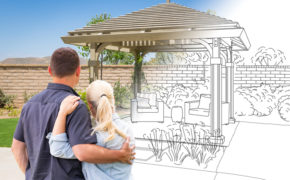How to Buy a House with 0% Down and Receive an Annual Tax Credit
Purchasing a home is arguably one of the biggest purchases you will make in your lifetime. For many, homeownership seems like a dream rather than a reality due to saving for a down payment and the extra costs of buying a house. But what if there was a way to buy a house with 0% down? And, what if homebuyers could receive an annual tax credit on their loan interest rate? We have great news: Both of these things are possible!
The USDA Rural Development program and the Mortgage Credit Certificate are making it easier for hopeful homebuyers to purchase a home. At Ross Mortgage, we’re committed to offering our customers a diverse selection of financing options, including loans you might not know existed.
Here’s a few things you need to know if you’re hoping to purchase a home and get the most out of your mortgage payment.
Rural Development (RD) Program
If the sound of living comfortably in a rural area is your dream, the USDA Rural Development (RD) program could be the right loan for you. The RD loan provides an affordable mortgage option to low- and moderate-income residents. The RD loan is a 30-year fixed-rate mortgage, and allows homebuyers to purchase a home with 0% down.
“The RD loan has some of the lowest mortgage insurance fees available, which is really important to a buyer,” said Danielle Boote, Ross Mortgage Brighton branch manager. “This program can be a dramatic assistance to homebuyers who may not be able to purchase a home otherwise.”
“I’ve closed a lot of RD loans with Ross Mortgage, and it absolutely helps our customers,” said Atlas Real Estate associate broker Jeff Dawley. “Atlas Real Estate and Ross have put people into homes using the RD program that wouldn’t have been able to purchase a home without that loan option.”
On top of purchasing a home with 0% down, the RD program’s private mortgage insurance (PMI) fees will eventually drop off. On a FHA mortgage, PMI stays there for the life of the loan. That alone provides a dramatic difference over the cost of homeownership.
RD loan applicants must meet income eligibility to qualify, and the home must have a predetermined eligibility address. You can check to see if the location of your dream home qualifies here.
Visit USDA’s website to learn more about the RD loan program.
Mortgage Credit Certificate
If the RD loan program sounded too good to be true, brace yourself for the Mortgage Credit Certificate (MCC)! The MCC provides homeowners with an annual tax credit on the annual mortgage interest paid.
“The MCC tax credit is, without a doubt, something every homebuyer in the state of Michigan should get,” said Ed Tilk, Ross Mortgage loan officer. “Essentially, homebuyers receive a 20% discount on their interest rates. It benefits the buyer, every single year, for the life of the loan.”
The tax credit is calculated by multiplying the total mortgage amount and loan interest rate to get the annual interest. Then, you take the annual interest rate and multiply it by 20% to get the annual tax credit amount.
Let’s say you buy a house for $100,000 with an interest rate of 4%. You’ll be paying $4,000 in interest, meaning you’ll get $800 back when you file your taxes!
“The MCC gives the consumer a tax benefit that they can see on their tax return, and it’s significant,” said Dawley. “This is real money that homebuyers are saving, year after year.”
The MCC credit can be combined with many loan options, including conventional, FHA, RD and VA loans. Learn more about MCC here.
Do you have questions about the RD loan program and the MCC tax credit? Send us a message and we’ll put you in touch with one of our expert loan officers.
- Atlas Real Estate
- how to buy a house with no money down
- mcc
- mcc tax credit
- Michigan mortgage lender
- Mortgage Credit Certificate
- Mortgage Credit Certificate Michigan
- Mortgage Credit Certificate program
- Mortgage Credit Certificate tax credit
- mortgage loans
- no money down mortgage
- Ross Mortgage
- Ross Mortgage Corporation
- Rural Development loans
- types of mortgage loans
- USDA Rural Development
- USDA Rural Development Michigan










